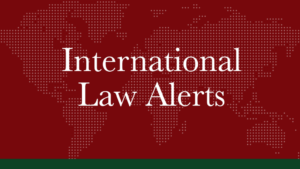
‘These guidelines – the first document of its kind – provide key guidance to States aiming to conduct investigations of international humanitarian law (IHL) violations, but also to other bodies and individuals seeking a more detailed understanding of investigations in armed conflict. The fact that they are now available in five different languages will allow for their further dissemination and use in the field’ underlines Professor Gloria Gaggioli, Director of the Geneva Academy.
Misinformation is on the rise, and the humanitarian sector has not escaped the consequences. The misinformation environment not only sustains itself in a vicious cycle, but also increases data protection challenges and disrupts humanitarian protection and assistance work.
In 2020, Bosnia-Herzegovina marked the 25th anniversary of the Dayton Peace Agreement and the end of the 1992-1995 conflict, which left the country with devastating consequences. Over 100,000 people have died and tens of thousands went missing as a result of the war. Over 7,000 of them are still unaccounted for.
In this post – celebrating the launch of the new ICRC Religion and Humanitarian Principles website and part of a joint blog symposium with Opinio Juris exploring the ICRC Commentary on the Third Geneva Convention, three eminent Buddhist scholars examine religious texts for insight on the treatment of prisoners of war.
The landmark Treaty on the Prohibition of Nuclear Weapons (TPNW) enters into force on Friday, 22 January 2021 as a new instrument of international humanitarian law.
Protracted armed conflict in Kalilangan village in the hinterlands of Iligan City, Lanao del Norte province, has displaced around 320 families. In 2020, they experienced fleeing to the village capital and staying in a school building and barangay hall thrice.
ICRC Commentary on the Third Geneva Convention – Ahmed Al-Dawoody, ICRC’s legal advisor on Islamic law, examines the religious texts for insight on the treatment of prisoners of war.
Many people have been displaced within Tigray, and almost 60,000 sought refuge in Sudan. Refugees and people displaced within the region suffer from a lack of food and essential services, like water and healthcare.
Lawrence Hill-Cawthorne, an Associate Professor in Public International Law at the University of Reading, considers the relationship between the ICRC’s interpretation of common Article 1 of the Geneva Conventions and the general rules on State responsibility.







































































































 on the upper right corner to select a video.
on the upper right corner to select a video.